Hooke - Study guides, Class notes & Summaries
Looking for the best study guides, study notes and summaries about Hooke? On this page you'll find 1046 study documents about Hooke.
Page 3 out of 1.046 results
Sort by
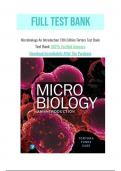
-
Test Bank For Microbiology: An Introduction Plus Mastering Microbiology, 13th Edition By Gerard J. Tortola
- Exam (elaborations) • 561 pages • 2023
-
- $19.49
- 3x sold
- + learn more
Test Bank Microbiology: An Introduction, 13th Edition Gerard J. Tortora Table of Contents: Part I: Fundamentals of Microbiology Chapter 1. The Microbial World and You Chapter 2. Chemical Principles Chapter 3. Observing Microorganisms through a Microscope Chapter 4. Functional Anatomy of Prokaryotic and Eukaryotic Cells Chapter 5. Microbial Metabolism Chapter 6. Microbial Growth Chapter 7. The Control of Microbial Growth Chapter 8. Microbial Genetics Chapter 9. Biotechnology and DNA Technology Pa...
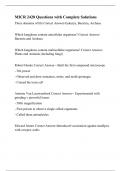
-
MICR 2420 Questions with Complete Solutions
- Exam (elaborations) • 46 pages • 2024
-
- $16.49
- + learn more
Three domains of life Correct Answer-Eukarya, Bacteria, Archaea Which kingdoms contain unicellular organisms? Correct Answer-Bacteria and Archaea Which kingdoms contain multicellular organisms? Correct Answer-Plants and Animals (including fungi) Robert Hooke Correct Answer-- Built the first compound microscope - 30x power - Observed and drew nematoes, mites, and mold sporangia - Coined the term cell Antoine Van Leeuwenhoek Correct Answer-- Experimented with grinding v powerful le...
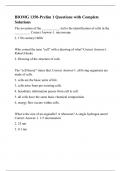
-
BIOMG 1350-Prelim 1 Questions with Complete Solutions
- Exam (elaborations) • 44 pages • 2024
-
- $15.99
- + learn more
The invention of the ___________ led to the identification of cells in the _________. Correct Answer-1. microscope 2. 17th century/1600s Who coined the term "cell" with a drawing of what? Correct Answer-1. Robert Hooke 2. Drawing of the structure of cork The "cell theory" states that: Correct Answer-1. all living organisms are made of cells. 2. cells are the basic units of life. 3. cells arise from pre-existing cells. 4. hereditary information passes from cell to cell. 5. all cel...
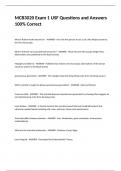
-
MCB3020 Exam 1 USF Questions and Answers 100% Correct
- Exam (elaborations) • 8 pages • 2024
- Available in package deal
-
- $11.99
- + learn more
MCB3020 Exam 1 USF Questions and Answers 100% CorrectMCB3020 Exam 1 USF Questions and Answers 100% CorrectMCB3020 Exam 1 USF Questions and Answers 100% CorrectMCB3020 Exam 1 USF Questions and Answers 100% CorrectMCB3020 Exam 1 USF Questions and Answers 100% Correct What is Robert Hooke known for? - ANSWER - He is the first person to see a cell. Also Helped construct the first microscope. What is Antonie van Leeuwenhoek known for? - ANSWER - Made His own Microscope (Single-lens), Observatio...
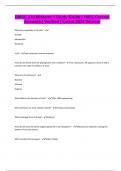
-
BMSC 210 Midterm 1 Study Guide | 100% Correct Answers | Verified | Latest 2024 Version
- Exam (elaborations) • 30 pages • 2024
- Available in package deal
-
- $13.49
- + learn more
What are properties of all cells? - Growth Metabolism Evolution LUCA - Last universal common ancestor How do we decide how the phylogenetic tree is drawn? - Use ribosomes. All organisms have it and it has been the same for billions of years What are the domains? - Bacteria Archaea Eukarya What defines the domains of cells? - Their rRNA sequencing What domains are most closely related? - Archaea and eukarya What emerged from Archaea? - Eukarya How do we know kw when oxygen appeare...
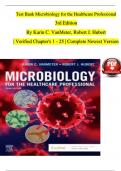
-
Test Bank Microbiology for the Healthcare Professional 3rd Edition By Karin C. VanMeter, Robert J. Hubert | Verified Chapter's 1 - 25 | Complete Newest Version 2024 A+
- Exam (elaborations) • 158 pages • 2024
-
- $12.99
- + learn more
Test Bank Microbiology for the Healthcare Professional 3rd Edition By Karin C. VanMeter, Robert J. Hubert | Verified Chapter's 1 - 25 | Complete Newest Version 2024 A+ Table of content 1. Scope of microbiology 2. Chemistry of life 3. Cell structure and function 4. Bacteria and archaea 5. Viruses 6. Eukaryotic microorganisms 7. Physical and chemical methods of control 8. Microbiological laboratory techniques 9. Microbiological laboratory safety issues 10. Pharmacology 11. Antimicrobi...
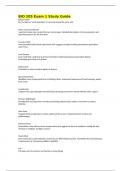
-
BIO 205 Exam 1 Study Guide |Latest Update Graded A+
- Exam (elaborations) • 9 pages • 2024
-
- $10.99
- + learn more
BIO 205 Exam 1 Study Guide Robert Hooke first to observe "small chambers" in cork and coined the term cells. Anton van Leeuwenhoek A garment maker who created his own microscopes. Detailed descriptions of microorganisms and described bacteria for the first time. Francisco Redi Used unsealed/sealed meat experiment with maggots to begin showing spontaneous generation wasn't true. Louis Pasteur Swan neck flask, used heat to prevent microbes. Ended spontaneous generation debat...
In this experiment you will study the stretching response of a rubber band (or a spring) and compare the observed behaviour with the predictions of Hooke’s Law.
![Get Ahead in 2024 with [Business Ethics as Rational Choice,Hooker] Study Guide](/docpics/3182920/64cbc23765c13_3182920_121_171.jpeg)
-
Get Ahead in 2024 with [Business Ethics as Rational Choice,Hooker] Study Guide
- Summary • 108 pages • 2023
-
- $20.48
- + learn more
Accelerate Your Learning with [Business Ethics as Rational Choice,Hooker] Solutions Manual! Why waste precious time searching for answers when you can have them at your fingertips? Our Solutions Manual for [Business Ethics as Rational Choice,Hooker] is your ultimate companion for academic excellence. Each solution is carefully explained, ensuring you understand the underlying concepts. Don't just memorize, truly comprehend the subject matter with our comprehensive Solutions Manual
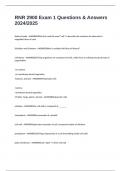
-
RNR 2900 Exam 1 Questions & Answers 2024/2025
- Exam (elaborations) • 23 pages • 2024
- Available in package deal
-
- $10.49
- + learn more
RNR 2900 Exam 1 Questions & Answers 2024/2025 Robert Hooke - ANSWERSWho first used the word "cell" to describe the chambers he observed in magnified slices of cork Schleiden and Schwann - ANSWERSWho is credited with the cell theory? cell theory - ANSWERSall living organisms are composed of cells, which form a unifying structural basis of organization -no nucleus -no membrane-bound organelles -bacteria, archaea - ANSWERSProkaryotic cells -nucleus -membrane-bound organell...

That summary you just bought made someone very happy. Also get paid weekly? Sell your study resources on Stuvia! Discover all about earning on Stuvia



